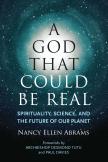Help My Belief
For theists, those who believe that God not only exists—for the moment I am side stepping the word real, as in the book title—and created the world but is also active in the world, this treatment of a “real” God who is an emergent entity of the world will bring a challenging and enriching experience. For the “new atheists,” like Richard Dawkins, Sam Harris, Christopher Hitchens and perhaps many others, it will bring a rude awakening as to how, without embracing theism, one can deal seriously with an alternative to the classical images of the God of religious faith. In brief, this book makes a serious and thought-provoking contribution to the interaction between our scientific knowledge and belief in God in modern society.
The fundamental thesis of this book is expressed thus by the author: “God persists and always will because it’s a fundamental characteristic of the connection between ourselves and the universe. That we’re connected to the universe is inevitable and indisputable, but until we had a scientific understanding of the universe, we could not imagine how. Now...we can break out of the old metaphors for God that have so cramped our thinking and expectations.” Unfortunately, this laudable thesis, although it speaks of “God,” is really addressing our image of God and is preceded by a declaration, repeated many times throughout the book, that the persistence in our need to image God is due neither to an independently existing God, creator of the universe that science seeks to understand, nor to our psychological need. So, while the “new atheists” are put down for the most part by the later denial, theists, with no reason offered that I can find in the book, are put down by the former, namely, the denial of an “independently existing God.”
So what is the “real” in the God that “could be”? We read: “This book is an exploration of what we choose to call real, because this choice is our opportunity. In a modern scientific understanding God can be real.” This means, it appears, that what is “real” is by our choice and is limited to what science can tell us about the real. This is unfortunately the author’s self-description of the book, which is not true of the whole book, although it is a constant refrain. A better and more comprehensive description, again in the author’s own words, would be: “Our religions can be as important to us today as they have ever been to anyone in history but only if they support us in integrating our way of thinking about God into a positive, coherent, accurate worldview.”
This book makes a significant contribution to that integration. It could have done this without unreasonably denying the existence of a God creator, whose image is wonderfully presented by the author in terms of our modern scientific understanding of the universe. Denying or asserting the existence of that which one is imaging is not relevant to the “reality” of the image, in the author’s sense of real. The image of God that emerges from the analysis in this book of our modern scientific knowledge of a dynamic universe is marvelous and makes a serious contribution to the growing amount of literature on analogical knowledge of God, mostly by theists. The uniqueness of this contribution is that it comes from a “non-theist.” I hesitate to use the word atheist for the author of this contribution.
Emergence, as a scientific phenomenon, is the key to understanding the dynamic universe we live in and, in fact, out of which we too emerged. The author presents a convincing discussion that our image of God is enriched by such an understanding of the universe. In fact, we have emerged in this dynamic universe as aspiring human beings, and we are endowed with “God aspirations,” to use the author’s phrase. The “real” God of those aspirations is the result of our modern scientific knowledge. There is no doubt that theists do well to take seriously such analyses.
However, to be honest to a genuine theistic image of God one must realize that in the Jewish-Christian tradition God is primarily a source of love and not of explanation. Faith is a gift of God’s love, totally gratuitous, not earned and not the result of reasoning. But such a great gift is nourished, and not just cherished, when one struggles to accept that precious gift as coherent with all of our human experiences. Today our scientific knowledge of the universe must be accepted as one of the most significant of those experiences. This book, I think, when read critically can be a very fruitful help toward accomplishing that coherence.
We all walk our own walks at our own pace. Nancy Abrams has shared her personal pilgrimage especially in the Introduction and has chosen a wider path to which her trek has led her and which she has eloquently described. Each of us, theist and non-theist alike, would profit immensely by joining her in that pilgrimage, while still walking our own walk at our own pace.
This article also appeared in print, under the headline “Help My Belief,” in the October 12, 2015, issue.








